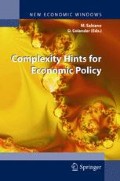Abstract
In this paper, interaction among taxpayers in the tax evasion game is considered by means of game theory with learning. This interaction has been largely neglected in the modeling of tax evasion so far, although it brings about results significantly different from those of a conventional model. In case of tax authority commitment to a certain auditing probability, nonzero cheating equilibrium becomes possible. In case of tax authority with no commitment to a certain auditing probability, cycling may occur instead of long-run equilibrium, allowing for explanation of the fluctuations in “honesty” of taxpayers within the model rather than by exogenous parameter shifts.
Access this chapter
Tax calculation will be finalised at checkout
Purchases are for personal use only
Preview
Unable to display preview. Download preview PDF.
References
Andreoni, J., B. Erard and J. Feinstein (1998): Tax Compliance. Journal of Economic Literature, June, pp. 818–860.
Bardsley, P. (1997): Tax compliance games with imperfect auditing. The University of Melbourne Department of Economics research paper no. 548.
Clotfelter, C. (1983): Tax Evasion and Tax Rates: an Analysis of Individual Returns. Review of Economics and Statistics, 65(3), pp. 363–73.
Cowell, F. (1990): The Economics of Tax Evasion, MIT Press, Cambridge, MA.
Dubin, J., M. Graetz and L. Wilde (1990): The Effect of Audit Rates on the Federal Individual Income Tax, 1977–1986. National Tax Journal, 43(4), pp. 395–409.
Engel, E., and J. Hines (1999): Understanding Tax Evasion Dynamics. NBER Working Paper No. 6903.
Erard, B., and J. Feinstein (1994): Honesty and Evasion in the Tax Compliance Game. Rand Journal of Economics, 25(1), pp. 1–19.
Fudenberg, D., and D. Levine (1998): The theory of learning in games. MIT Press, Cambridge, MA.
Giles D., and P. Caragata (1999): The learning path of the hidden economy: the tax burden and the tax evasion in New Zealand. Econometrics Working Paper 9904, Department of Economics, University of Victoria, Canada.
Graetz, M., J. Reinganum and L. Wilde (1986): The Tax Compliance Game: Towards an Interactive Theory of Law Enforcement. Journal of Law, Economics and Organization, 2(1), pp. 1–32.
Lipatov, V. (2004): Evolution of Personal Tax Evasion. Unpublished manuscript, IUE.
Poterba, J. (1987): Tax Evasion and Capital Gains Taxation. American Economic Review, Papers and Proceedings, 77, pp. 234–39.
Reinganum, J., and L. Wilde (1986): Equilibrium Verification and Reporting Policies in a Model of Tax Compliance. International Economic Review, 27(3), pp. 739–60.
Sanchez, I., and J. Sobel (1993): Hierarchical Design and Enforcement of Income Tax Policies. Journal of Public Economics, 50(3), pp. 345–69.
Slemrod, J., and S. Yitzhaki (2002): Tax Avoidance, Evasion and Administration. Handbook of Public Economics, volume 3, 1423–1470, North Holland.
Schneider, F., and D. Enste (2000): Shadow Economies: Size, Causes, and Consequences. Journal of Economic Literature, March, pp.77–114.
Vasin, A. and P. Vasina (2002): Tax Optimization under Tax Evasion: The Role of Penalty Constraints. EERC Working Paper 01/09E.
Wane, W. (2000): Tax evasion, corruption, and the remuneration of heterogeneous inspectors. World Bank Working Paper 2394.
Witte, A., and D. Woodbury (1985): The Effect of Tax Laws and Tax Administration on Tax Compliance. National Tax Journal, 38, pp.1–13.
Author information
Authors and Affiliations
Rights and permissions
Copyright information
© 2007 Springer-Verlag Italia
About this chapter
Cite this chapter
Lipatov, V. (2007). Complexity of Out-of-Equilibrium Play in Tax Evasion Game. In: Complexity Hints for Economic Policy. New Economic Windows. Springer, Milano. https://doi.org/10.1007/978-88-470-0534-1_5
Download citation
DOI: https://doi.org/10.1007/978-88-470-0534-1_5
Publisher Name: Springer, Milano
Print ISBN: 978-88-470-0533-4
Online ISBN: 978-88-470-0534-1
eBook Packages: Business and EconomicsEconomics and Finance (R0)

